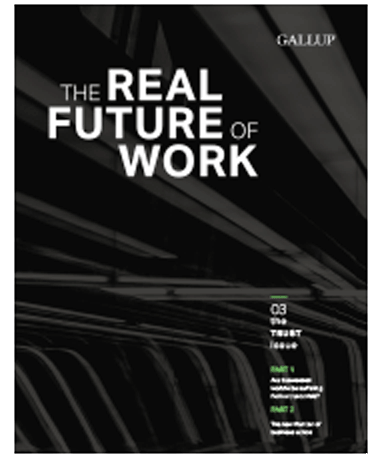Story Highlights
- Faith in employers is evaporating for French workers
- Managers are key to serving as conduit for crucial work lifeline needs
- Employ these key communication steps for the return-to-work transition
French workers haven't had a great deal of faith in their leaders, and what little they did have is evaporating.
In April 2020, Gallup analysis found that just over one-third of the French workers (36%) strongly agree their employer has communicated a clear plan of action and that they're informed about the state of the company (33%). And one in four French workers (26%) feel the leadership at their company can "successfully manage emerging challenges."
Granted, few French employees expected their managers to handle challenges well before the pandemic -- that number hasn't budged since 2019 (25%). But the data also show these doubts about leadership undermine workers' sense of security.
Their skepticism will affect their performance -- prior to the pandemic, Gallup analysis found a correlation in France between workers believing leadership can successfully manage emerging challenges and being more likely to be engaged. And employee engagement, or the lack thereof, absolutely affects productivity and performance outcomes for workers. Addressing this trust deficit will affect the success of their company's return-to-work transition plans. Now is the time for leaders in France to renew the trust of their staff, and it starts with their managers.
How Your Managers Can Serve as the Conduit
Managers, presumably, understand that workers are extraordinarily sensitive to their personal health and safety right now. Nonetheless, one in four French workers strongly agree their employer cares about their wellbeing, and one-third (34%) feel confident that following their company's health policies will keep them safe. That skepticism is not endemic to employees in general -- Gallup finds that 51% of U.S. workers strongly agree their company cares about their wellbeing, and 41% of workers in the U.S. believe following their company's health policies will keep them safe.
In good times and bad, managers are always the conduit of information from leader to worker. So if managers aren't keeping French workers informed right now, it can't be because they don't know workers are scared. More likely by far, it's because managers aren't communicating leadership's strategies clearly or making those strategies relevant to workers.
Now is the time for leaders in France to renew the trust of their staff, and it starts with their managers.
Or it may be because managers don't know what's going on: 39% of French managers strongly agree with the statement, "My immediate supervisor keeps me informed about what is going on at my company." That's a mere 11-percentage-point improvement over the people they lead.
Managers can't communicate information they don't have, and the data suggest top-down communication isn't working optimally. Companies need to fill the information vacuum quickly. Gallup finds employees who strongly agree that, "My employer has communicated a clear plan of action in response to the coronavirus or COVID-19," are more likely to strongly agree with the statement, "I have confidence in the leadership of the company to successfully manage emerging challenges," than those who disagree or are neutral about their company's communicated plans in response to COVID-19. Plans of action typically come to employees from managers -- and the information deficit is making things more difficult for managers than they need to be.
39% of French managers strongly agree with the statement, "My immediate supervisor keeps me informed about what is going on at my company."
To repair employees' sense of broken trust, French leaders need to signal that they're not just pondering, but acting and sharing what answers they have, that they're creating solutions where they can and have mastery over the elements within their control. Despite the many unknown factors -- which workers understand -- leaders' motto should be "the situation is serious, but we are working on it." Three crucial aspects of communication will help them deliver that message: compassion, reliable information and hope.
Three Key Aspects Are Essential to Repairing Broken Workplace Trust
1. Compassion:
Leaders' messages have consequences. Clarity prevents confusion, whereas confusion creates doubt. Be clear -- it's a kindness. Furthermore, communication has an emotional effect on workers, and that should be planned for. If the leader is going to drop a bombshell, there will be emotional fallout. Prepare all the company's leaders to attend compassionately to their workforce's emotional needs.
2. Reliable information:
Workers need to know and understand the measures a company is taking to keep people safe from the coronavirus and the company safe from a depressed economy. Objective facts -- delivered clearly, openly and transparently -- make the situation more comprehensible and predictable. Workers need access to reliable information about COVID-19 through trusted, official sources as well as detailed information concerning the organization's security concept, changes in workflows, processes and shifts. The communication of factual information is clearly a problem in many French companies and needs to be rectified for workers to feel safe.
3. Hope:
If you want to move people, you have to give them hope. Hope is central to overcoming obstacles and it provides energy -- it will be needed after the crisis to get off to a good start into the "next normal." Even now, great things are happening in companies, extraordinary things are being done, and people are learning valuable lessons that will be important post-pandemic: new ways of working, new ways of collaborating, new ways of decision-making, new forms empowering themselves and others. Leaders need to describe the positives they've seen and share what they've learned in words everyone can understand.
Leaders' motto should be "the situation is serious, but we are working on it."
Employees' need for information is more acute in a time of crisis, as is their need to trust leaders. Those two elements are related and when they're absent, employee performance suffers. Poor performance will be a millstone around the necks of French businesses in the economic climate to come. Their leaders must recapture their employees' trust -- which they'll need to create a successful return-to-work transition -- but time is running out.
Discover more insights on how to lead through disruption with Gallup's latest COVID-19 research:
- Learn about the COVID-19 strategies and policies of the world's largest companies by reading this article.
- Watch this webinar to discover more insights into the data.
- Discover our learning programs that help leaders and managers build relationships based on trust.




